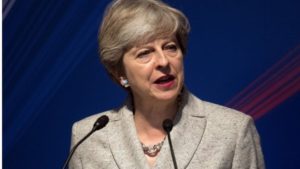Brexit falls further into disarray
A leaked policy paper shows that the UK government has drawn up plans to slash the levels of migration from the European Union immediately after Brexit.
The document, obtained by The Guardian, comes as the whole Brexit process becomes increasing mired in recrimination and uncertainty.
In it Home Office officials have outlined a series of stringent measures aimed at making immigration from the EU harder after Britain leaves the bloc in 2019.
They include ending the free movement of labour on the day that Britain leaves the EU, and making it harder for lower-skilled workers to enter.
Opponents of Brexit have criticised the measures as unnecessarily harsh, and some commentators said they were at odds with the government’s stated aim of achieving a transition deal with the EU after Brexit.
But government ministers said voters expected to see a reduction in immigration.

Theresa May
The paper, said to be a draft, attempts to ensure that businesses give priority to “resident labour”.
EU citizens who come to the UK for lower-skilled jobs could be awarded a two-year residency, while those in higher-skilled occupations would be given five years.
The changes would come in at the end of the transition period after Britain’s departure, which could last up to three years.
Other changes that could be introduced include a minimum salary for low-skilled workers coming to the UK and a temporary program for seasonal workers.
But many have slammed the paper, including London Lord Mayor Sadiq Khan who said it read “like a blueprint on how to strangle London’s economy”.
NHS
The plan is also at odds with the need to fill 176,000 health and care vacancies in the National Health Service (NHS). For the sector to survive, its workers must be given special status
It has rung alarm bells at the NHS which it tackling the greatest workforce crisis in its history.
With the number of vacant NHS jobs at 86,000, it would seem impossible to fill these posts while cutting immigration.
When the 90,000 social care vacancies in nursing homes and the like are factored in, the pressures are set to increase even further.
Just recently, it was announced that the NHS in England will be spending 100 million pounds on recruiting foreign doctors.
And the number of EU workers in the NHS is vast. According to the House of Commons library 9 per cent of staff who joined the NHS in 2016 were from other EU countries.
In England 12 per cent of NHS staff are nationals of a country other than the UK.
Suppressed reports
Meanwhile, Liberal Democrat leader Vince Cable claims British PM Theresa May has suppressed nine separate reports into immigration when she was home secretary because the findings were “inconvenient” to the government
Mr Cable said the studies showing no immigration impact on jobs and wages were kept quiet during his time as business secretary in the previous coalition government.
“When I was business secretary there were up to nine studies that we looked at that took in all the academic evidence,” Mr Cable said.
“It showed that immigration had very little impact on wages or employment. But this was suppressed by the Home Office under Theresa May, because the results were inconvenient.
“I remember it vividly. Overwhelmingly it has been the case that overseas workers have been complimentary rather than competitive to British workers.”
Research sector
The leaked paper has also sparked comment that UK immigration policy will have a large impact on the country’s research effort.
The paper says that the UK “will seek to agree a far-reaching science and innovation agreement with the EU that establishes a framework for future collaboration”, across the EU’s research funding programs as well as areas such as defence and space research.
But Kurt Deketelaere, secretary general of the League of European Research Universities, said that if the UK ends the free movement of labour after Brexit, with those in highly skilled professions – likely to include researchers – granted work permits for three to five years, it will impact on research.
“The whole migration policy will be absolutely decisive for what is possible on research”, Professor Deketelaere said, adding that top researchers would not work in the UK under such circumstances.
Pig farmers
The pig industry has also expressed concern following the publication of the leaked document saying that so called ‘unskilled workers’ from the EU were vital to its survival.
A spokesman said the pig industry was “alarmed” by the Home Office’s suggestion that migrant labour from the EU should be severely restricted, particularly those who fall under the ‘unskilled’ definition.
“Many workers in the pig sector fall into this category but are in fact highly skilled and make a significant contribution to the economy,” the spokesman said.
Laurie Nowell
AMES Australia Senior Journalist












